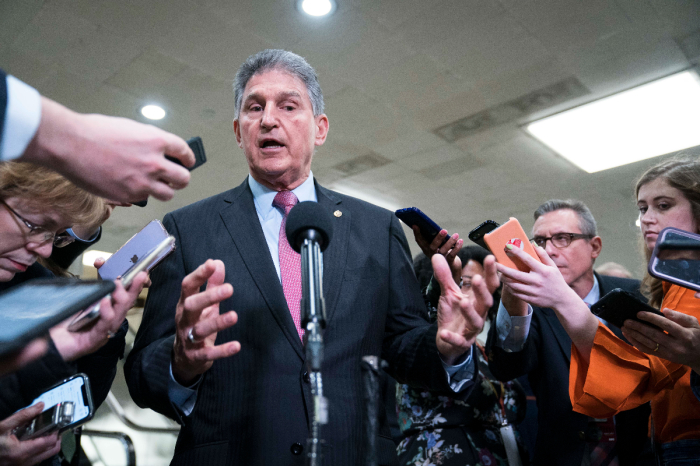Manchin denounces HR 1 voting rights bill, says it will 'destroy binds of our democracy'

One of the congressional Democrats’ legislative proposals, H.R. 1, has run into a significant roadblock as one of the most influential Democrats in the U.S. Senate has announced that he will vote against the legislation.
In an op-ed for The Charleston Gazette-Mail Sunday, Sen. Joe Manchin, D-W.Va., announced that he would vote against the For the People Act, which Democrats bill as a necessary measure to protect the right to vote.
Since Democrats have a narrow 50-50 majority in the Senate and all Republicans are expected to vote against the legislation, Manchin’s decision will likely deal a fatal blow to the bill also known as H.R. 1.
Manchin, who represents one of the most conservative states in the country, maintained that “congressional action on federal voting rights legislation must be the result of both Democrats and Republicans coming together to find a pathway forward.”
He warned that by embracing a wide-reaching bill without Republican support, his fellow Democrats risk “further dividing and destroying the republic we swore to protect and defend as elected officials.”
“I believe that partisan voting legislation will destroy the already weakening binds of our democracy, and for that reason I will vote against the For the People Act,” he added. “For as long as I have the privilege of being your U.S. Senator, I will fight to represent the people of West Virginia, to seek bipartisan compromise no matter how difficult and to develop the political bonds that end divisions and help unite the country we love.”
The For the People Act passed the Democratic-controlled House of Representatives earlier this year but has always faced long odds in the Senate because of the filibuster rule, which requires most legislation to receive 60 votes instead of a simple majority.
While Democrats have proposed eliminating the legislative filibuster to enable legislation to pass with a simple majority, Manchin poured cold water on that effort as well, vowing that “I will not vote to weaken or eliminate the filibuster.”
The 73-year-old former governor of the Mountain State acknowledged that while the legislative process under the current Senate rules “can be frustrating and slow” and “force compromises that are not always ideal,” the alternative is much worse.
“Do we really want to live in an America where one party can dictate and demand everything and anything it wants, whenever it wants?" he asked. "I have always said ‘If I can’t go home and explain it, I can’t vote for it.’ And I cannot explain strictly partisan election reform or blowing up the Senate rules to expedite one party’s agenda.”
As an alternative to the For the People Act, Manchin suggested that the Senate work on passing the John Lewis Voting Rights Act, which has already secured the support of one Republican: Sen. Lisa Murkowski, R-Alaska.
According to Manchin, this bill would “update the formula states and localities must use to ensure proposed voting laws do not restrict the rights of any particular group or population.”
The senator stressed the importance of opposing “laws that seek to needlessly restrict voting” while acknowledging “the need to secure our elections.”
Conservatives and Republicans have warned that the For the People Act will have negative implications for Americans’ trust in the outcome and legitimacy of elections.
In a previous interview with The Christian Post, Hans von Spakovsky, a senior legal fellow at the Heritage Foundation, asserted that H.R. 1 would “make it easier to cheat and easier to manipulate election results.”
A group of 20 Republican attorneys general reached a similar conclusion. They expressed particular concern about “the Act’s regulation of congressional elections, including by mandating mail-in voting, requiring states to accept late ballots, overriding state voter identification (‘ID’) laws, and mandating that states conduct redistricting through unelected commissions.”
Additionally, they argued that mandated “nationwide automatic voter registration and Election Day voter registration” would “provide too many opportunities for non-citizens and others ineligible to vote, to register, and cast fraudulent ballots before officials can take preventive action.”
In addition to the For the People Act, Manchin’s opposition could hurt Democrats' chances of passing the Equality Act, another top legislative priority for congressional Democrats that would codify protections based on sexual orientation and gender identity into federal discrimination law.
Manchin opposed the Equality Act when it was first introduced in 2019, but his opposition did not matter since the Republican-controlled Senate never brought the bill up for a vote.
While Manchin has not explicitly opposed the Equality Act this time around, he is expected to vote against the legislation. Conservatives worry about the Equality Act’s implications for religious liberty and women’s sports.
Manchin has explicitly announced that he will not support a bill that would make Washington, D.C. a state, a decision that will likely cause the demise of the Democrat-backed legislation.
Even if Manchin supported the aforementioned legislative initiatives, his opposition to the filibuster would likely prevent them from becoming law because of the lack of Republican support.
Ryan Foley is a reporter for The Christian Post. He can be reached at: [email protected]



























